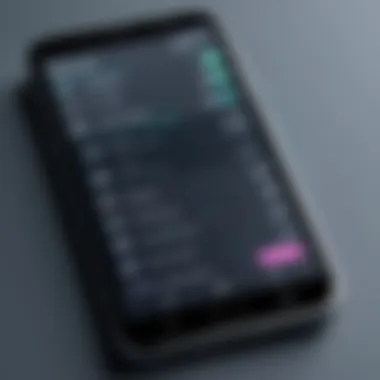How to Block Your Number When Making Calls


Intro
Privacy in communication has taken on a significant role in today's digital age. The ability to block your phone number when making calls is a topic that resonates with many. It's not merely about avoiding unwanted return calls; it encompasses aspects of personal security and discretion. The desire for privacy is often met with confusion regarding the technicalities involved. This article aims to clarify these methods while shedding light on different networks and devices that facilitate caller ID blocking. Understanding how to manage your visibility during phone conversations empowers users to take control of their communications.
Why Block Your Number?
Blocking your number can be vital for several reasons:
- Privacy Concerns: In an era where personal data is often compromised, many individuals wish to keep their phone numbers confidential.
- Unwanted Attention: Some may want to avoid unwanted calls from individuals or organizations they don't wish to engage with.
- Professional Communication: In certain professional settings, privacy might be crucial to maintain discretion, especially when contacting clients, partners, or stakeholders.
Understanding these motivations can provide context as to why one should learn the mechanics of blocking a phone number.
Methods to Block Your Number
Blocking your number can be achieved in various ways, depending on factors such as device type and network provider. Here are the common methods:
1. Using Built-in Phone Settings
Many smartphones include options in their settings that allow users to block their number by default. This is often found in the Call Settings or Phone Settings menus. For instance, on an iPhone, you would navigate to Settings > Phone > Show My Caller ID, where you can toggle this feature off.
2. Dialing a Prefix
Another method is to use a simple dialing prefix before a phone number. For example, dialing *67 before the number you intend to call will block your caller ID on most networks in the U.S. This method is convenient as it doesn't require any changes to settings.
3. Consult Your Carrier
Different mobile carriers have specific features regarding caller ID blocking. For final solutions, users may contact their network provider. Carriers such as Verizon, AT&T, and T-Mobile offer services that can either permanently or temporarily block caller ID, often via their customer service channels.
"While blocking your number can be useful, it's essential to consider the implications and ensure that any necessary communication can still take place."
Understanding Network Variations
Each mobile network provider has its procedures concerning caller ID blocking. Knowing your carrier's policy can help in effectively managing your phone visibility. Furthermore, some networks may offer additional features such as anonymous calling or permanent number blocking.
Closure
In essence, the ability to block one’s number is an important tool for maintaining privacy in telecommunications. The methods available vary across devices and networks but share common purpose and importance. Having a solid understanding of how to block your number can assist in navigating the often-confusing landscape of telecom privacy. Whether for personal safety, professional engagement, or simply to maintain distance from unwanted calls, learning these methods is crucial for modern communication etiquette.
Intro to Number Blocking
The purpose of blocking a phone number extends beyond mere privacy; it encompasses aspects of security, control, and peace of mind. Knowing you can conceal your number provides a layer of protection against unsolicited calls, allowing you to manage who can contact you. Additionally, this ability fosters a sense of agency in communication. Understanding that you can choose whether to reveal your identity is empowering, particularly in sensitive situations where exposure might lead to unwanted consequences.
Purpose of Blocking a Phone Number


Blocking your phone number serves multiple purposes, each crucial in various contexts. To begin with, personal safety stands as the foremost reason. In a world where harassment and unwanted contact are prevalent, the ability to hide your number can deter malicious intent. If one feels threatened or uncomfortable, this feature allows them to shield their identity while still holding conversations.
Additionally, blocking your number plays a role in professional settings. Many individuals prefer to keep their personal and professional lives distinct. For instance, business calls can be made without disclosing personal information, which can help maintain professional boundaries. Moreover, in scenarios like job interviews or client communications, blocking your number lends an air of professionalism and keeps personal life at bay.
Furthermore, individuals may choose to block their number when contacting companies or organizations. Often these interactions can lead to repetitive follow-ups if the company has access to your number. By keeping your number confidential, one can engage with service providers without the remorse of unwelcome spam or marketing calls.
Common Scenarios for Number Blocking
There are numerous scenarios in which blocking your number is considered. Understanding these situations not only contextualizes the necessity of number blocking but also showcases its relevance in daily life:
- Unwanted Calls: People frequently encounter persistent telemarketers or spam callers. In such cases, blocking one’s number can halt these excessive interruptions.
- Sensitive Communication: Situations involving sensitive topics, like discussing financial issues or personal matters, may require callers to block their number for privacy.
- Temporary Connections: When needing to connect with someone temporarily, for example, for rental inquiries or casual meetups, blocking the number may help protect one’s identity.
- Keeping Relationships Healthy: In personal relationships, especially after a breakup or disagreement, some individuals may find it wise to block their number in communications to avoid conflicts or escalations.
By highlighting the importance and advantages of blocking your number, readers gain valuable tools for protecting their privacy and managing their communication more effectively.
Understanding Caller
Caller ID is a feature that allows the recipient of a phone call to see the identity of the caller before answering. This technology has become essential in modern communication, as it greatly influences how individuals engage in phone conversations. Blocking one’s number is a tactical choice influenced by various factors, including privacy concerns and safety considerations. To understand the implications of blocking a number, it is vital to grasp how caller ID operates and what happens when a caller chooses not to reveal their number.
How Caller Works
Caller ID works through the exchange of data between telephone systems. When a call is initiated, the calling party's phone number is transmitted along with the call. This information is displayed on the recipient's device, allowing them to identify who is calling. In traditional landline networks, the caller ID feature uses an analog signal. In contrast, mobile networks and Voice over Internet Protocol (VoIP) systems utilize digital signaling to convey this information.
To illustrate how this process unfolds:
- Initiation of Call: The caller dials a number.
- Transmission of Caller ID: The number is sent from the calling network to the receiving network.
- Display on Recipient's Device: The recipient's phone processes the incoming data and displays the calling party's number.
Caller ID can also include names, but this depends on the service provider. Notably, it can be manipulated to avoid revealing the caller's actual number — for instance, via prefix codes or settings adjustments. Understanding this mechanism is crucial for anyone considering number blocking as an option.
Implications of Revealing One's Number
Revealing one’s phone number carries various implications. Firstly, it affects privacy. Many individuals are concerned about unsolicited calls or potential harassment. When one’s number is visible, they become more susceptible to spam calls or other unwanted communications. Additionally, revealing a number can infringe upon personal safety. Individuals in sensitive situations, such as victims of stalking or harassment, may find it essential to keep their phone numbers confidential.
Moreover, the visibility of one’s number can shape perception. Calls from unknown numbers may be ignored, while familiar ones may prompt immediate attention. This illustrates the social dynamics involved in communication.
In summary, understanding how caller ID functions and the implications of exposing a phone number is crucial. It helps individuals make informed decisions about whether to block their number when contacting others. Protecting one’s privacy and maintaining control over personal communication can be significant factors in today’s interconnected world.
Methods to Block Your Number
Blocking your phone number is not just a matter of privacy; it is an essential skill in an age dominated by frequent communication. Knowing how to block your number can protect you from unwanted calls and maintain your confidentiality in professional and personal conversations. There are several practical methods to achieve this across different platforms. This section will explore three primary methods: using prefix codes, adjusting phone settings, and third-party applications. Each method has unique benefits and considerations to help you decide which is best for your needs.
Using Prefix Codes
Prefix codes are a straightforward way to hide your number for a single call. These codes are specific digits dialed before the actual phone number. When using prefix codes, you do not need to change any settings on your phone or install any applications. For example, in the United States, dialing *67 before the number ensures that your caller ID shows "Private Number" or "Blocked".
This method is efficient and quick, making it ideal for those who rarely need to block their number. However, it requires you to remember the prefix and to enter it every time you want your number blocked.


Some benefits of using prefix codes include:
- Immediate effectiveness without changing your phone's system settings.
- Applicable on any device that supports calling.
Yet, it's essential to note that prefix codes may not work for emergency calls or certain numbers, such as toll-free lines. Therefore, it's crucial to understand the limitations before relying solely on this method.
Adjusting Phone Settings
Most smartphones today offer built-in options for blocking your number across all outgoing calls. This allows you to make your number appear as private or blocked without needing to dial any codes.
On an iPhone, users can navigate to Settings > Phone > Show My Caller ID and toggle the option off. For Android users, this feature can usually be found under Settings > Calls > Additional Settings > Caller ID.
The primary advantage of adjusting phone settings is convenience. Once set, your number will stay hidden by default until you decide to change it back. This option suits individuals who frequently prefer to keep their number private.
However, users should also be aware of the following:
- Blocking your number this way might limit your ability to receive calls from people who do not recognize your number.
- Not all devices have this feature available, as it can vary depending on your mobile carrier.
Third-Party Applications
For those who desire more control over their privacy, third-party applications can provide advanced features. Apps like Hushed or Burner allow users to create temporary phone numbers for specific purposes. Such applications are beneficial for people engaging in transactions, offering services, or using online dating platforms, where anonymity is preferable.
These applications often come with additional privacy features, including message encryption and self-destructing messages. When choosing a third-party app, consider:
- Compatibility with your existing device and services.
- Any costs involved, as many apps include fees for premium features.
- The extent to which the app protects your data and personal information.
It is wise to read user reviews and verify the app's credibility before installation. Although convenient, relying on third-party applications does introduce considerations about data security.
Adopting any of these methods will help you control how your number is presented to the recipient. Whether you choose prefix codes for short-term needs, adjust your phone settings for everyday use, or utilize third-party applications for advanced privacy, understanding these methods will facilitate more secure and controlled communication.
Blocking Your Number on Different Networks
Understanding how to block your number across different networks is crucial for maintaining privacy in today's digital world. Various platforms offer unique features for number blocking, catering to diverse user needs. This section delves into the specifics, focusing on both mobile networks and VoIP services to provide a comprehensive overview.
Blocking on Mobile Networks
Mobile networks, like Verizon, AT&T, T-Mobile, and Sprint, provide specific ways for users to block their numbers. Typically, this can be done by using a simple prefix code or by adjusting phone settings on the device.
- Prefix Codes: Many mobile carriers allow users to dial a code before the number they wish to call. For example, dialing *67 before the number will keep your identity hidden from the recipient. This feature is often reliable for one-time use.
- Phone Settings: In addition to prefix codes, users can go into their phone's settings. Different operating systems have distinct paths for this. For instance, on an iPhone, this can be found under Settings > Phone > Show My Caller ID. Similarly, Android devices have Settings > Calls > Additional Settings > Caller ID. Adjusting these settings can block your number from showing, providing a useful layer of privacy.
- Carrier-Specific Apps: Some carriers provide their own apps that include features for blocking caller ID. Users can download these applications from the respective app stores and follow the instructions provided within the app. This method might offer more customized options for blocking and managing calls.
Blocking on VoIP Services
VoIP services, such as Skype, WhatsApp, and Google Voice, have their own methods for number blocking. Unlike traditional networks, VoIP services may not always have an inherent caller ID feature to block. However, there are effective ways to ensure privacy when making calls.
- App Settings: Most VoIP services have specific settings for caller ID. For example, in Skype, you can manage your Caller ID settings through your profile. This allows users to decide whether to display their number. In WhatsApp, however, the application uses the phone number tied to the account, making it harder to block.
- Temporary Numbers: Services such as Google Voice allow users to create temporary numbers. By using these numbers for less important communications, users can shield their primary numbers. This is especially useful for online interactions where privacy is a concern.
- Usage of Disguised Numbers: Some VoIP services offer features to hide or disguise the actual number being used. This can be a significant benefit, especially for those who prioritize anonymity during calls.


In summary, understanding the blocking methods on different networks is crucial for users concerned about privacy. Each network or service may have distinct mechanisms, from prefix codes on mobile devices to settings adjustments in VoIP applications. Making careful choices about how and when to block your number can lead to a more secure communication experience.
Impacts of Blocking Your Number
Blocking your phone number can have significant implications, both on the call recipients and for the caller. Understanding these impacts is critical in ensuring effective communication while balancing privacy needs.
Effects on Call Recipients
When a number is blocked, the recipient of the call may encounter various experiences. The primary effect is that their caller ID will display the call as ‘Private Number’, ‘Blocked Caller’, or something similar. Often, this can lead to confusion or concern for the recipient. They might wonder why their caller has chosen to withhold their number. It can also lead to missed opportunities, especially in professional contexts, where identify recognition is essential.
- Trust Issues: If an individual consistently receives calls from an unknown number, they may perceive these calls as suspicious or even spam. This perception can be detrimental to genuine communication, leading to higher chances of ignored calls.
- Decisions on Answering: Potential recipients may choose not to answer calls from hidden numbers. This decision is often rooted in their past experiences, and fear of telemarketing or unwanted solicitation.
- Psychological Effects: There are psychological factors to consider as well. Recipients may feel unimportant or disregarded if their phone is ringing from a hidden number. On a larger scale, inconsistent and concealed contact can hinder relationships, whether personal or professional.
Legal Considerations
Blocking a number also raises legal issues surrounding privacy and harassment. While individuals have the right to protect their identities, doing so should be approached with caution. Here are aspects to consider:
- Legal Right to Privacy: Most jurisdictions recognize an individual's right to privacy. This extends to keeping one’s phone number confidential in certain situations. However, misusing this right can have serious consequences.
- Harassment: If a person repeatedly blocks their number to call someone with the intent of harassing them, they could face legal repercussions. Authorities take harassment claims seriously, and anonymity provides a cover often exploited by those intending to cause distress.
- Recording Calls: Laws vary about recording calls, especially those that involve private numbers. If one party does not disclose their calling identity, it could violate consent laws in certain places.
Important Note: Always check local laws regarding privacy and communication to ensure you stay compliant while utilizing number-blocking features.
Maintaining Privacy in Communication
The importance of maintaining privacy lies in the numerous scenarios where revealing one’s contact number might lead to unwanted consequences. For instance, unsolicited marketing calls or harassment can invade one's day-to-day life. Therefore, knowledge about blocking a number and protecting this aspect of communication contributes significantly to one’s sense of security. Protecting your phone number serves not just to prevent interruptions but also to shield oneself from potential identity theft and fraud.
Benefits of Keeping Your Number Private
Keeping your number private comes with several distinct benefits:
- Enhanced Security: It minimizes the risk of manipulative calls or scams that often target the unsuspecting. A blocked number often creates a shield against potential threats.
- Control Over Communication: Blocking your number allows you to dictate who can reach you and under what circumstances. This can be particularly valuable in professional environments where confidentiality is key.
- Reduction of Harassment: By keeping your number private, you lessen the chances of receiving persistent calls from sales representatives or unwanted individuals. This maintains your peace of mind during critical moments.
- Protection of Personal Boundaries: In a world where everyone is constantly connected, it is essential to establish boundaries. Privacy in communication reaffirms your right to decide who gains access to your personal life.
Potential Risks of Not Blocking Your Number
Conversely, neglecting to block your number may lead to various adverse outcomes:
- Exposure to Unsolicited Calls: By not protecting your number, you open the floodgates to countless unwanted calls. This can disrupt work, personal time, and intervals meant for relaxation.
- Increased Vulnerability: Without safeguards in place, your number could fall into the wrong hands. This increases the risk of identity theft, as malicious entities often exploit personal information.
- Loss of Control: Failing to manage who can contact you can leave you feeling disempowered. It can become challenging to maintain your boundaries when your number is readily available to anyone.
- Negative Impact on Mental Health: Regular disturbances from unwanted calls can contribute to stress and anxiety, affecting mental well-being.
It is apparent that the consequences of not securing your number may be far-reaching. Making the conscious choice to block your number or maintain a level of privacy can significantly enhance one’s safety and overall quality of life. In a time where technology poses both advantages and threats, it becomes imperative to navigate communication channels wisely.
Closure and Best Practices
Blocking your number when making calls is a vital skill in today’s digital age. This article outlined the various techniques for achieving this, emphasizing both the mechanics and the importance of privacy in communication. Understanding how to block your number can prevent unwanted consequences such as harassment or intrusion. Furthermore, maintaining control over your personal information fosters a sense of security in interpersonal interactions.
Summarizing the Key Points
- Purpose of Blocking: Individuals may wish to block their number for various reasons—safety, privacy, or discretion in communications.
- Methods Reviewed: Techniques include using prefix codes, adjusting phone settings, or utilizing third-party applications depending on the device in use.
- Network Differences: Different mobile networks and VoIP services offer unique options for blocking numbers, making it essential to understand your service provider's capabilities.
- Legal and Ethical Considerations: While blocking your number is generally legal, there are nuances that may impact your choice based on circumstances.
- Privacy Benefits: Keeping your number private can shield against unwanted solicitations, allowing for more control in how you communicate with others.
Understanding these key points will allow readers to navigate their communication methods more confidently and securely.
Recommendations for Safe Communication
- Be Aware of Your Environment: Before sharing sensitive information over the phone, consider who might be listening or observing.
- Utilize Do Not Disturb Features: Many smartphones offer do not disturb modes that can block all calls except from selected contacts. This can bolster your privacy.
- Research Third-Party Apps: Explore trustworthy applications that specialize in managing privacy and call settings. Verify reviews and ensure they do not put your data at risk.
- Stay Updated on Regulations: Be informed about laws related to caller ID blocking in your area, as they can vary significantly by region.
- Practice Caution with Unknown Callers: If an unfamiliar number calls, use discretion in what you disclose, even if blocking your number provides a layer of privacy.







